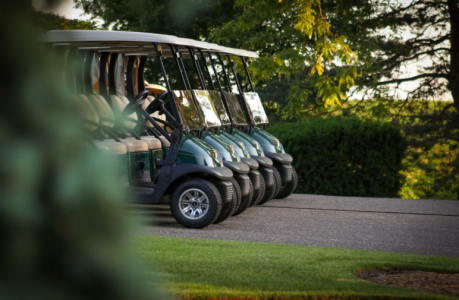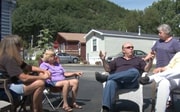Golf carts are cruising through America’s suburbs, but trouble is following
- Replies 0
What started as a quirky convenience has quietly rolled into one of the most polarizing trends in American suburbs.
Once reserved for retirement communities or golf courses, these small vehicles are now showing up in driveways and side streets from Nashville to St. Louis.
To some, they are a fun, eco-friendly alternative for short errands. To others, they are a dangerous nuisance that doesn’t belong in traffic.
In recent years, golf carts specifically built for the road—equipped with headlights, mirrors, and seat belts—have seen a surge in popularity.
Families in suburban neighborhoods are increasingly using them for grocery runs, school drop-offs, or quick errands instead of firing up the SUV.
Supporters argue the carts save money, cut down on congestion, and offer a greener way to travel short distances.
But the rise has also stirred heated debates online, with some residents going as far as to call them a “plague” on local roads.

Much of the frustration comes from safety concerns, with stories of carts weaving through traffic or children driving them without adult supervision.
In one Nashville discussion thread, residents described dads cruising down busy boulevards with toddlers unsecured in the front seat.
Others complained about near misses, including drivers running red lights or teens zipping through alleys without stopping. For critics, it’s less about convenience and more about the risks of mixing lightweight carts with full-size vehicles.
The tension isn’t limited to Tennessee. In Illinois, more than 600 residents signed a petition to allow golf carts on local streets, but the measure was struck down by village officials.
In Missouri, some noted preteens and even adults without licenses use the vehicles for late-night fast food runs.
Also read: Pennies are disappearing—here’s what to do with your old coins
Tragedies have already been linked to the trend, from fatal accidents in Georgia to a mother driving children into an Ohio lake. For law enforcement and city planners, the carts represent a growing safety and regulatory challenge.
Still, many defend the lifestyle shift, insisting golf carts can be safer than scooters or e-bikes if used responsibly. Some families say owning one allows them to cut down to a single car, making suburban life more affordable.
Enthusiasts argue they reduce emissions, keep large vehicles off narrow streets, and bring a sense of community charm.
Yet insurance experts warn of hidden costs, since most homeowners’ policies don’t cover accidents involving golf carts on public roads, leaving operators financially vulnerable if something goes wrong.
Cities across the US are now grappling with how to respond, with some considering permits, speed restrictions, and required safety upgrades for golf cart drivers.
Urban planners note that without clear regulations, accidents will only rise as more households adopt the trend.
Advocates, however, say sensible rules could help integrate the carts safely into neighborhoods, transforming them into a viable middle ground between cars and bicycles.
The debate reveals how quickly suburban transportation norms are shifting—and how divided communities are about what belongs on their streets.
Also read: Could monthly payments like this change how Americans live?
Even in places where golf carts are fully embraced, the issue often boils down to how responsibly they are used.
Many accidents occur not because of the carts themselves, but because of reckless behavior, lack of protective gear, or failure to follow traffic laws.
Safety advocates are now pushing for public awareness campaigns, arguing that education could be just as effective as stricter regulations.
As the controversy builds, one thing is clear: the small vehicles are no longer just for the green, and they’re not leaving suburbia anytime soon.
Read next: The $15,400 drive-thru disaster White Castle didn’t see coming

Would you welcome golf carts in your neighborhood as a greener alternative, or do you see them as an accident waiting to happen?
Once reserved for retirement communities or golf courses, these small vehicles are now showing up in driveways and side streets from Nashville to St. Louis.
To some, they are a fun, eco-friendly alternative for short errands. To others, they are a dangerous nuisance that doesn’t belong in traffic.
In recent years, golf carts specifically built for the road—equipped with headlights, mirrors, and seat belts—have seen a surge in popularity.
Families in suburban neighborhoods are increasingly using them for grocery runs, school drop-offs, or quick errands instead of firing up the SUV.
Supporters argue the carts save money, cut down on congestion, and offer a greener way to travel short distances.
But the rise has also stirred heated debates online, with some residents going as far as to call them a “plague” on local roads.

Golf carts are cruising through America’s suburbs, but trouble is following. Image source: Dean / Unsplash
Much of the frustration comes from safety concerns, with stories of carts weaving through traffic or children driving them without adult supervision.
In one Nashville discussion thread, residents described dads cruising down busy boulevards with toddlers unsecured in the front seat.
Others complained about near misses, including drivers running red lights or teens zipping through alleys without stopping. For critics, it’s less about convenience and more about the risks of mixing lightweight carts with full-size vehicles.
The tension isn’t limited to Tennessee. In Illinois, more than 600 residents signed a petition to allow golf carts on local streets, but the measure was struck down by village officials.
In Missouri, some noted preteens and even adults without licenses use the vehicles for late-night fast food runs.
Also read: Pennies are disappearing—here’s what to do with your old coins
Tragedies have already been linked to the trend, from fatal accidents in Georgia to a mother driving children into an Ohio lake. For law enforcement and city planners, the carts represent a growing safety and regulatory challenge.
Still, many defend the lifestyle shift, insisting golf carts can be safer than scooters or e-bikes if used responsibly. Some families say owning one allows them to cut down to a single car, making suburban life more affordable.
Enthusiasts argue they reduce emissions, keep large vehicles off narrow streets, and bring a sense of community charm.
Yet insurance experts warn of hidden costs, since most homeowners’ policies don’t cover accidents involving golf carts on public roads, leaving operators financially vulnerable if something goes wrong.
Cities across the US are now grappling with how to respond, with some considering permits, speed restrictions, and required safety upgrades for golf cart drivers.
Urban planners note that without clear regulations, accidents will only rise as more households adopt the trend.
Advocates, however, say sensible rules could help integrate the carts safely into neighborhoods, transforming them into a viable middle ground between cars and bicycles.
The debate reveals how quickly suburban transportation norms are shifting—and how divided communities are about what belongs on their streets.
Also read: Could monthly payments like this change how Americans live?
Even in places where golf carts are fully embraced, the issue often boils down to how responsibly they are used.
Many accidents occur not because of the carts themselves, but because of reckless behavior, lack of protective gear, or failure to follow traffic laws.
Safety advocates are now pushing for public awareness campaigns, arguing that education could be just as effective as stricter regulations.
As the controversy builds, one thing is clear: the small vehicles are no longer just for the green, and they’re not leaving suburbia anytime soon.
Read next: The $15,400 drive-thru disaster White Castle didn’t see coming
Key Takeaways
- Golf carts have become a common sight in US neighborhoods, sparking both enthusiasm and anger.
- Safety is a central concern, with children, teens, and even distracted adults reportedly driving them in traffic.
- Petitions in some states seek legalization, while accidents and fatalities highlight risks.
- Advocates highlight affordability, convenience, and eco-friendliness, while critics warn of liability and lack of protection.






